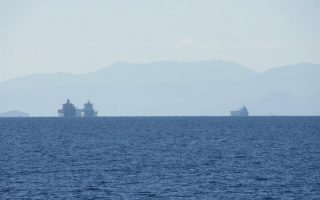Tactical silence

When it comes to issues of national significance, how they are presented and by whom is always important, particularly if that person is in a responsible position. Naturally such issues are rich fodder for the media and are propagated with alarming speed, usually under catchy titles, but this serves no purpose in solving the real problem.
Greece has often paid a high toll when national sentiment has been pushed too far. In one case, the Turks reached all the way to Domokos because an elite had stirred public sentiment into a frenzy without first considering the overall situation. We also have a terrible record in allowing such issues to divide us into those who think Greece needs to take back Constantinople and those who confuse realpolitik with finding any solution to whatever problem, regardless of the consequences.
Diplomacy is an art that requires consensus, a cool head and well-calculated moves. Thankfully, Greece has good people in key positions who combine professionalism with gumption.
You may ask what should Greece do about Turkey right now. If we take a more careful look, we will see that we often allow ourselves to be caught up in a vicious cycle, forgetting that the Greek state is able to respond to any provocations in an institutional manner by expressing its concerns to the United Nations, NATO, the European Union and any other institution that counts. When it needs, it can also respond more dynamically behind the scenes by warning friends of the country’s red lines. What certainly doesn’t serve any purpose in diplomacy is verbalizing these issues for public consumption.
The situation could get dangerous. Turkish government officials are displaying childish behavior such as lashing out at the Greek president by name, but thankfully the adults both in Athens and Ankara are still keeping things under control.
I’ll go back several years to illustrate my point. I was a correspondent at a US State Department briefing along with other Greek colleagues. One of them asked the spokesman whether the US recognized six or 10 miles as the boundary of Greece’s air space. The American official said that he would have to look into the matter before giving an answer and told the correspondents that they should not persist with the subject until the legal department was consulted.
Nevertheless, one of my colleagues asked the same question again and again, four of five times. Two months later, we got an answer that basically said the issue is disputed and should be resolved. So my colleague asked the State Department spokesman: “Why did you give such an answer knowing the tension there is over the Aegean right now?” And the American official answered: “Because you asked me five times.”





